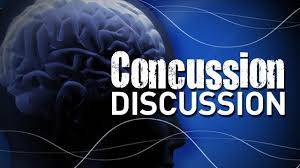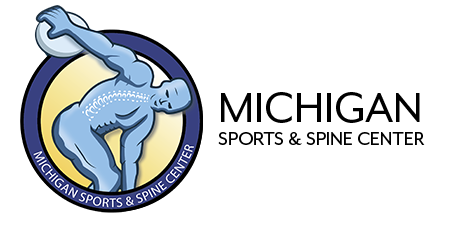Concussions: When in doubt, pull them out!

Concussions have been a very hot topic in the news the last couple weeks with the recent concussion of University of Michigan football player who continued to play after suffering a hard hit. The diagnosis of a concussion on the sideline can be tough since we often have to rely on talking to the player about how they feel at the moment. Even though there has been advancement in the diagnosis and treatment of concussions, knowing when to take an athlete out of the game isn’t always a cut and dry answer.
Dr. Jeff Pierce has spent many years treating athletes of all ages, and from all areas of sports. Several staff members of Michigan Sports and Spine are also certified athletic trainers, who work on the sidelines with players during games and practices, and together they have come up with some tips and guidelines that may help you determine if your athlete should continue playing or be taken out of the game.
Dr. Pierce stresses the importance of removing the athlete immediately once a symptom is observed and if you are unsure if they are symptomatic, side with caution and remove them from the game.
When in doubt, pull them out!
CONCUSSION FACTS
- A concussion is a type of traumatic brain injury brain injury.
- A concussion can occur with or without loss of consciousness.
- What seems to be mild bump, blow to the head, or getting your bell rung, can be serious and cause a concussion.
- Younger athletes experience greater severity, and can take longer to recuperate.
- A concussion can occur with or without a hit to the head. A sudden jarring can be just as traumatic.
- Signs and symptoms of a concussion can show up right after the injury or may not appear for days or weeks after the injury.
- After one concussion, an athlete is 1 – 2 times more likely to receive a second one.
CONCUSSION SYMPTOMS
These symptoms may or may not be immediately noticeable, but may include the following, individually or in combination:
- Appearing dazed, stunned or confused
- Confused about an assignment or position
- Answers questions slowly or forgets and instruction
- Is unsure of game, score, or opponent
- Difficulty thinking clearly or loss of memory
- Shows mood, behavior, or personality changes
- Feeling sluggish, hazy, or groggy
- Headache or blurry vision
- Balance problems or dizziness
- Sensitivity to light or noise
- Confused
- Nausea or vomiting
RECOVERING FROM A CONCUSSION
Concussion-like symptoms are numerous. A trip to the emergency room is never a wrong choice, but most concussions can be treated conservatively with your family physician or a sports medical physician. However, if an athlete experiences the following symptoms, take them to the emergency room immediately!
- Symptoms rapidly worsen in severity
- Loss of consciousness or “blacking out”
- Vomiting
- Slurred speech, or unequal pupil dilation
Most athletes with a concussion will recover quickly and fully. But for some athletes, signs and symptoms of concussion can last for days, weeks, or longer. If an athlete has a concussion, his or her brain needs time to heal. A repeat concussion that occurs before the brain recovers from the first—usually within a short time period (hours, days, weeks)—can slow recovery or increase the chances for long-term problems. An athlete should return to sports practices under the supervision of an appropriate health care professional. When available, be sure to work closely with your team’s certified athletic trainer.
ABOUT MICHIGAN SPORTS & SPINE CENTER:
We’re innovative leaders utilizing cutting-edge technologies such as musculoskeletal ultrasounds, PRP, stem cell treatment, and other innovative procedures. Michigan Sports & Spine Center is committed to resolving your pain, not simply masking it. We treat the whole body, not just the injury, and perform preventative treatment so your injury doesn’t come back. Our studies prove that Michigan Sports & Spine Center has patient success rates much higher than the national average. We treat everyone from high-profile athletes to your neighbor next door. Our primary focus is getting our patients back into the game of life!
